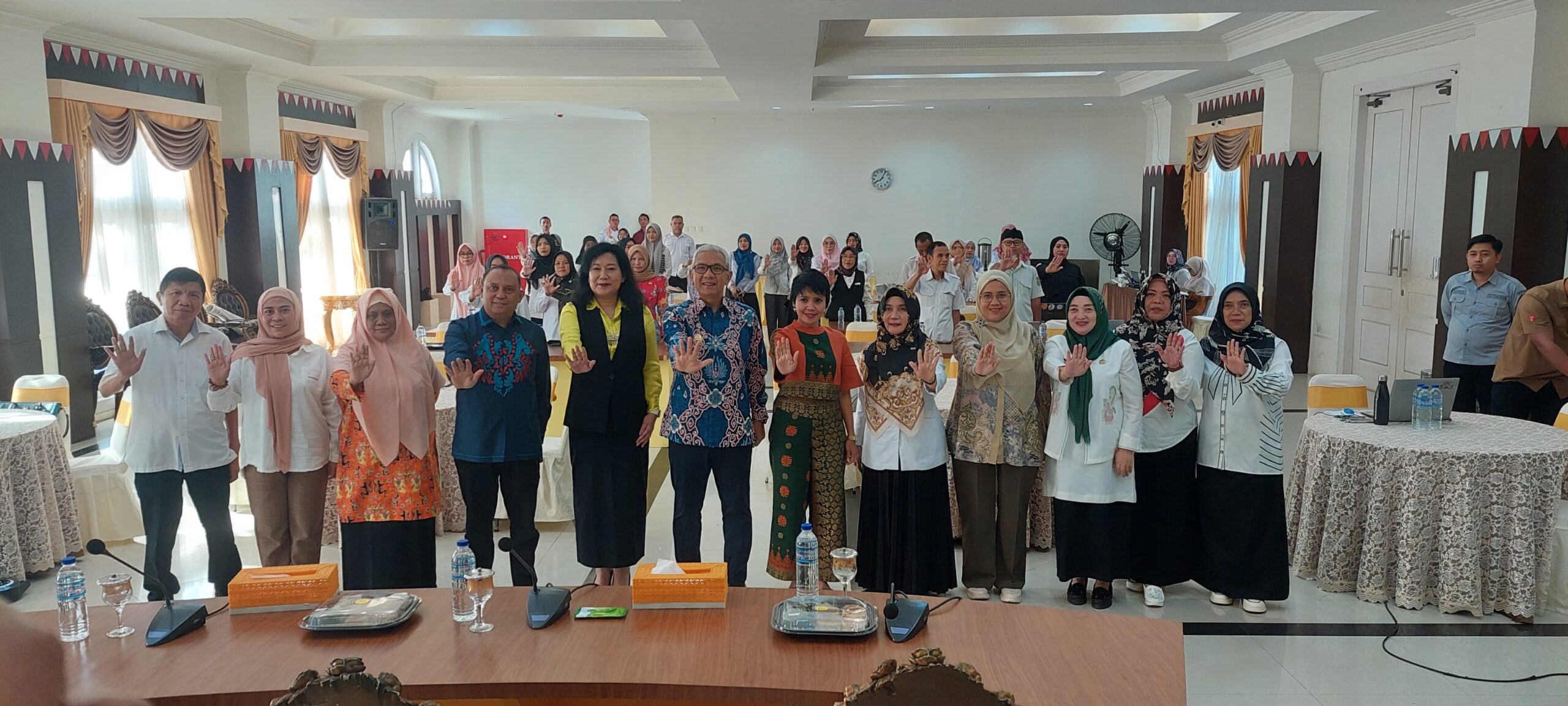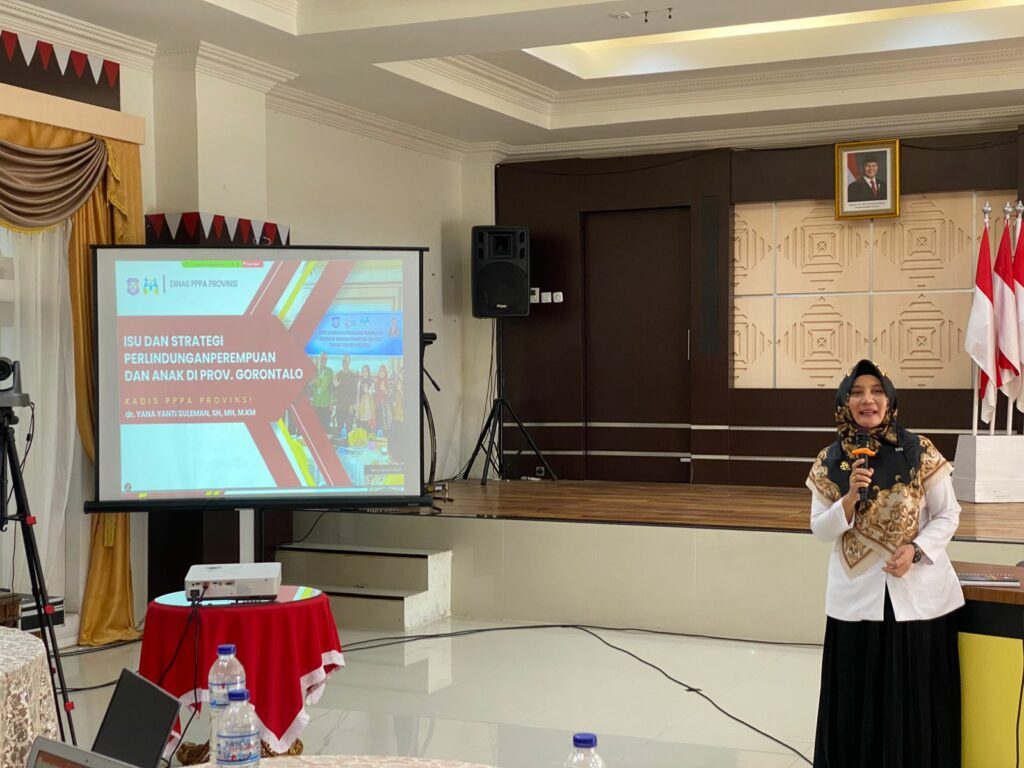Strengthening Local Government Services to Address Gender-Based Violence in Gorontalo

The Vision of Golden Indonesia 2045, outlined in the National Long-Term Development Plan 2025–2045, prioritizes gender equality and inclusive societies. These objectives are reflected in the “Asta Cita”, the eight aspirations of the president and vice president, particularly Asta Cita 4, which focuses on gender equality, human resource development, and strengthening the role of women, youth, and people with disabilities.
Within this framework, the Gorontalo Provincial Government, supported by the Australia-Indonesia Partnership Program (SKALA), is improving services for victims of Gender-Based Violence (GBV).
From November 6 – 8, 2024, SKALA partnered with local authorities in Gorontalo to conduct a three-day training event to enhance the capacity of government agencies and civil society organizations in effective GBV response service provision. The event included 40 participants from local government offices and organisations representing women, children, and people with disabilities. National trainers from the Ministry of Women’s Empowerment and Child Protection (KPPPA) and experts from the Pulih Foundation led sessions on institutional capacity building and practical tools for service delivery.
Bridging National Priorities with Local Challenges
The training aligns with Indonesia’s broader agenda of empowering women and strengthening institutional support for child protection. Gorontalo has embraced this vision by establishing Integrated Service Units for the Protection of Women and Children (UPTD PPA) under Governor Regulation No. 15 of 2024. These units deliver comprehensive services for GBV victims, including legal aid, psychological support, and temporary shelter, in line with the Sexual Violence Law and Presidential Regulation No. 55 of 2024.
Despite these frameworks, Gorontalo faces significant challenges. The province has one of Indonesia’s highest child marriage rates (13.65% in 2022), exceeding the national average of 8.06%. Ranked third nationally for child marriage, after Nusa Tenggara Barat and Kalimantan Tengah, the issue correlates with other social challenges, including school dropouts, stunting, and violence against women and children. Limited resources, weak inter-agency coordination, and outdated regional regulations, such as Regional Regulation (Perda) No. 1 of 2016, further exacerbate these issues.
Strengthening Gender-Based Violence Response Mechanisms
The capacity building addressed these challenges by focusing on minimum service standards, operationalising UPTD PPAs, and fostering collaboration among stakeholders. Yayasan BaKTI with support from the INKLUSI program shared best practices, while representatives from Bappenas provided insights on Indonesia national priorities’ agenda related with protection from violence.
Acting Governor, Rudy Salahuddin, emphasized the importance of addressing GBV as part of Gorontalo’s broader priorities to reduce poverty and improve access to basic services. Participants also discussed the important role of UPTD PPA in reaching vulnerable groups.
Mrs. Yana Yanti Sulaeman, Head of the Women’s Empowerment and Child Protection Service (DP3A), highlighted the urgency of addressing Gorontalo’s high rates of child marriage, which perpetuate cycles of poverty and exacerbate issues like stunting and school dropouts. She noted the need for updated policies and strengthened GBV services to address these interconnected challenges.
Commitments and Next Steps
The training resulted in key commitments such as prioritizing the establishment of UPTD PPA in districts and cities, as directed by the Regional Secretariat (Letter No. 000.8.1/P2PA/3200/XI/2024). Participants also agreed to integrate GBV response measures into planning and budgeting processes, such as the Regional Medium-Term Development Plan.
Additionally, updating Gorontalo’s outdated Regional Regulation No. 1 of 2016 is critical to aligning with national policies and providing a stronger legal foundation for GBV response efforts. As is improved inter-agency coordination and collaboration with civil society which will be vital for creating an effective support system for GBV victims.
Towards Gender Equality
This capacity building highlighted the importance of collaboration in addressing GBV and promoting gender equality. By equipping local governments and civil society organizations with the tools and knowledge needed, Gorontalo is taking meaningful steps toward creating a society that upholds gender equality and protects its most vulnerable populations. SKALA will continue to support Gorontalo in governance improvements, resource mobilisation, and stakeholder engagement.
Through its efforts, Gorontalo is setting an example for other provinces in Indonesia and demonstrating that progress is possible with coordinated action and shared commitment.

Head of DP3A Gorontalo, Mrs. Yana Yanti Sulaeman, presents “The Issues and Strategies on Protection of Women and Children in Gorontalo”






